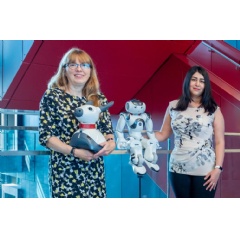Helping robots make a better first impression
Researchers track the personalities of social robots to improve how they interact with humans

An interdisciplinary research team from the University of Waterloo’s Social and Intelligent Robotics Research Lab (SIRRL) has found that people prefer interacting with robots they perceive to have social identities like their own.
This finding was made by a pair of Waterloo professors: Dr. Moojan Ghafurian, based in the Department of Systems Design Engineering and Dr. Kerstin Dautenhahn, from the Department of Electrical and Computer Engineering, who worked together to conduct new research on human interactions with social robots. These robots possess social abilities and can interact with humans in interpersonal and social manners.
Their research measured the social identities of social robots that humans liked to interact with, focusing on perceived sentiments of robotic identities. They were looking to improve the ways people would want to interact with social robots in health and well-being areas.
The study included 95 participants between the ages of 20 and 67 who were asked to evaluate social robots based on the Affect Control Theory (ACT), which emphasizes qualities like goodness, activity, and power. Ghafurian notes that these ACT traits were used in the study as they are easier to use for designing social robot behaviours than other commonly used methods for creating social robot personalities.
Participants in this study were shown images of 11 different social robots to evaluate how their identities were perceived. The researchers studied how the participants’ reaction impacted their reported interest in working with them in a health or well-being context.
“People could interact better with social robots that are able to interact with them in a natural way and are capable of adjusting their behaviours based on who they interact with,” Ghafurian said. “To improve the robots’ social behaviours, we looked at how they can adjust their identities to better suit the individuals they interact with. In other words, to build personalized social robots.”
This research indicates that participants were more interested in working with social robots in a health and well-being context when they perceived a closer match between their identity and the robot’s. Although the participants were only shown images of robots, participants had consensus in rating the perceived identities of each robot.
“I’m interested in how social robots can support the health and well-being of older adults, which could significantly impact the aging population by filling in existing healthcare gaps for people that need extra care,” Ghafurian said. “This research sets a foundation to understand how we can make those technologies more successful.”
Future research will expand on this study and involve actual robots with which the participants will interact, where the different identities will also be manipulated in social robot behaviours and interactions with individuals.
More information about this work can be found in a research paper published recently by the Association for Computing Machinery.
( Press Release Image: https://photos.webwire.com/prmedia/7/320281/320281-1.jpg )
WebWireID320281
This news content was configured by WebWire editorial staff. Linking is permitted.
News Release Distribution and Press Release Distribution Services Provided by WebWire.